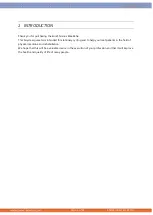
Page 9 of 30
EN109-1413760-47 IFU
The devices can be used for exercise testing. The ACSM states that in those individuals who require
testing, absolute and relative contraindications must be considered.
The contraindications stated by ACSM are as follows:
Absolute
•
A recent significant change in the resting electrocardiogram (ECG) suggesting significant
ischemia, recent myocardial infarction (within 2 d), or other acute cardiac event
•
Unstable angina
•
Uncontrolled cardiac dysrhythmias causing symptoms or hemodynamic compromise
•
Symptomatic severe aortic stenosis
•
Uncontrolled symptomatic heart failure
•
Acute pulmonary embolus or pulmonary infarction
•
Acute myocarditis or pericarditis
•
Suspected or known dissecting aneurysm
•
Acute systemic infection, accompanied by fever, body aches, or swollen lymph glands
Relative
•
Left main coronary stenosis
•
Moderate stenotic valvular heart disease
•
Electrolyte abnormalities (e.g., hypokalemia or hypomagnesemia)
•
Severe arterial hypertension (i.e., systolic blood pressure [SBP] of >200 mm Hg and/or a
diastolic BP [DBP] of >110 mm Hg) at rest
•
Tachydysrhythmia or brady dysrhythmia
•
Hypertrophic cardiomyopathy and other forms of outflow tract obstruction
•
Neuromotor, musculoskeletal, or rheumatoid disorders that are exacerbated by exercise
•
High-degree atrioventricular block
•
Ventricular aneurysm
•
Uncontrolled metabolic disease (e.g., diabetes, thyrotoxicosis, or myxedema)
•
Chronic infectious disease (e.g., HIV)
•
Mental or physical impairment leading to inability to exercise adequately
A remark is made that relative contraindications can be superseded if benefits outweigh the risks of
exercise. In some instances, these individuals can be exercised with caution and/or using low-level
endpoints, especially if they are asymptomatic at rest.
Source: American College of Sports Medicine. ACSM's guidelines for exercise testing and prescription. 9
th
edition.
Philadelphia: Lippincott Williams & Wilkins.









































